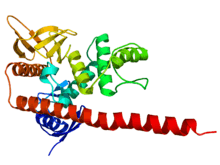ERM protein family
| Ezrin/radixin/moesin family | |||||||||
|---|---|---|---|---|---|---|---|---|---|
 | |||||||||
| Identifiers | |||||||||
| Symbol | ERM | ||||||||
| Pfam | PF00769 | ||||||||
| InterPro | IPR011259 | ||||||||
| SCOP | 1ef1 | ||||||||
| SUPERFAMILY | 1ef1 | ||||||||
| |||||||||
The ERM protein family consists of three closely related proteins, ezrin,[2] radixin[3] and moesin.[4][5] The three paralogs, ezrin, radixin and moesin, are present in vertebrates, whereas other species have only one ERM gene. Therefore, in vertebrates these paralogs likely arose by gene duplication.[6]
ERM proteins are highly conserved throughout evolution. More than 75% identity is observed in the N-terminal and the C-terminal of vertebrates (ezrin, radixin, moesin), Drosophila (dmoesin) and C. elegans (ERM-1) homologs.[7]
Structure
ERM molecules contain the following three domains:[5]
- N-terminal globular domain, also called FERM domain (Band 4.1, ezrin, radixin, moesin). The FERM domain allows ERM proteins to interact with integral proteins of the plasma membrane, or scaffolding proteins localized beneath the plasma membrane.[6] The FERM domain is composed of three subdomains (F1, F2, F3) that are arranged as a cloverleaf.
- extended alpha-helical domain.
- charged C-terminal domain. This domain mediates the interaction with F-actin.
Ezrin, radixin and merlin also contain a polyproline region between the central helical and C-terminal domains.
Function
ERM proteins crosslink actin filaments with plasma membranes. They co-localize with CD44 at actin filament-plasma membrane interaction sites, associating with CD44 via their N-terminal domains and with actin filaments via their C-terminal domains.[5][8]
ERM proteins Moesin directly binds to microtubules via its N-terminal FERM domain in vitro and stabilizes microtubules at the cell cortex in vivo. This interaction is required for specific ERM-dependent functions in mitosis.[9]
Activation
ERM proteins are highly regulated proteins. They exist in two forms:[6][7]
- the FERM domain is able to interact with the F-actin binding site and this head-to-tail interaction maintains ERM proteins into a folded form; in this state, ERM proteins are inactive for the folding prevents either integral protein binding, or actin-binding.
- if this head-to-tail interaction is disrupted, ERM proteins unfold, leading to an open and active conformation.
In culture cells, ERM proteins mainly exhibit the folded conformation (about 80-85%[10]).
The current model for ERM proteins activation is a two-steps mechanism:[11]
- First, phosphatidylinositol 4,5-bisphosphate interaction at the plasma membrane induces a pre-opening of ERM molecule
- Then, a not yet identified kinase phosphorylates a Threonine localized in a highly conserved region of the C-terminal domain. The phosphate will stabilize the opening of the molecule.
References
- ↑ PDB: 1E5W; Edwards SD, Keep NH (June 2001). "The 2.7 Å crystal structure of the activated FERM domain of moesin: an analysis of structural changes on activation". Biochemistry. 40 (24): 7061–8. doi:10.1021/bi010419h. PMID 11401550.
- ↑ Bretscher A (August 1983). "Purification of an 80,000-dalton protein that is a component of the isolated microvillus cytoskeleton, and its localization in nonmuscle cells". J. Cell Biol. 97 (2): 425–32. doi:10.1083/jcb.97.2.425. PMC 2112519
 . PMID 6885906.
. PMID 6885906. - ↑ Tsukita S, Hieda Y, Tsukita S (June 1989). "A new 82-kD barbed end-capping protein (radixin) localized in the cell- to-cell adherens junction: purification and characterization". J. Cell Biol. 108 (6): 2369–82. doi:10.1083/jcb.108.6.2369. PMC 2115614
 . PMID 2500445.
. PMID 2500445. - ↑ Lankes W, Griesmacher A, Grünwald J, Schwartz-Albiez R, Keller R (May 1988). "A heparin-binding protein involved in inhibition of smooth-muscle cell proliferation". Biochem. J. 251 (3): 831–42. PMC 1149078
 . PMID 3046603.
. PMID 3046603. - 1 2 3 Tsukita S, Yonemura S, Tsukita S (February 1997). "ERM proteins: head-to-tail regulation of actin-plasma membrane interaction". Trends Biochem. Sci. 22 (2): 53–8. doi:10.1016/S0968-0004(96)10071-2. PMID 9048483.
- 1 2 3 Bretscher A, Edwards K, Fehon RG (August 2002). "ERM proteins and merlin: integrators at the cell cortex". Nat Rev Mol Cell Biol. 8 (8): 586–99. doi:10.1038/nrm882. PMID 12154370.
- 1 2 Fiévet B, Louvard D, Arpin M (May 2007). "ERM proteins in epithelial cell organization and functions". Biochim Biophys Acta. 1773 (5): 653–60. doi:10.1016/j.bbamcr.2006.06.013. PMID 16904765.
- ↑ Yonemura S, Hirao M, Doi Y, Takahashi N, Kondo T, Tsukita S, Tsukita S (February 1998). "Ezrin/Radixin/Moesin (ERM) Proteins Bind to a Positively Charged Amino Acid Cluster in the Juxta-Membrane Cytoplasmic Domain of CD44, CD43, and ICAM-2". J. Cell Biol. 140 (4): 885–95. doi:10.1083/jcb.140.4.885. PMC 2141743
 . PMID 9472040.
. PMID 9472040. - ↑ Solinet S, Mahmud K, Stewman SF, Ben El Kadhi K, Decelle B, Talje L, Ma A, Kwok BH, Carreno S (July 2013). "The actin-binding ERM protein Moesin binds to and stabilizes microtubules at the cell cortex". J. Cell Biol. 202 (2): 251–60. doi:10.1083/jcb.201304052. PMID 23857773.
- ↑ Gautreau A, Louvard D, Arpin M (July 2000). "Morphogenic Effects of Ezrin Require a Phosphorylation-Induced Transition from Oligomers to Monomers at the Plasma Membrane". J Cell Biol. 150 (1): 193–203. doi:10.1083/jcb.150.1.193. PMC 2185562
 . PMID 10893267.
. PMID 10893267. - ↑ Fievet BT, Gautreau A, Roy C, Del Maestro L, Mangeat P, Louvard D, Arpin M (March 2004). "Phosphoinositide binding and phosphorylation act sequentially in the activation mechanism of ezrin". J Cell Biol. 164 (5): 653–9. doi:10.1083/jcb.200307032. PMC 2172172
 . PMID 14993232.
. PMID 14993232.